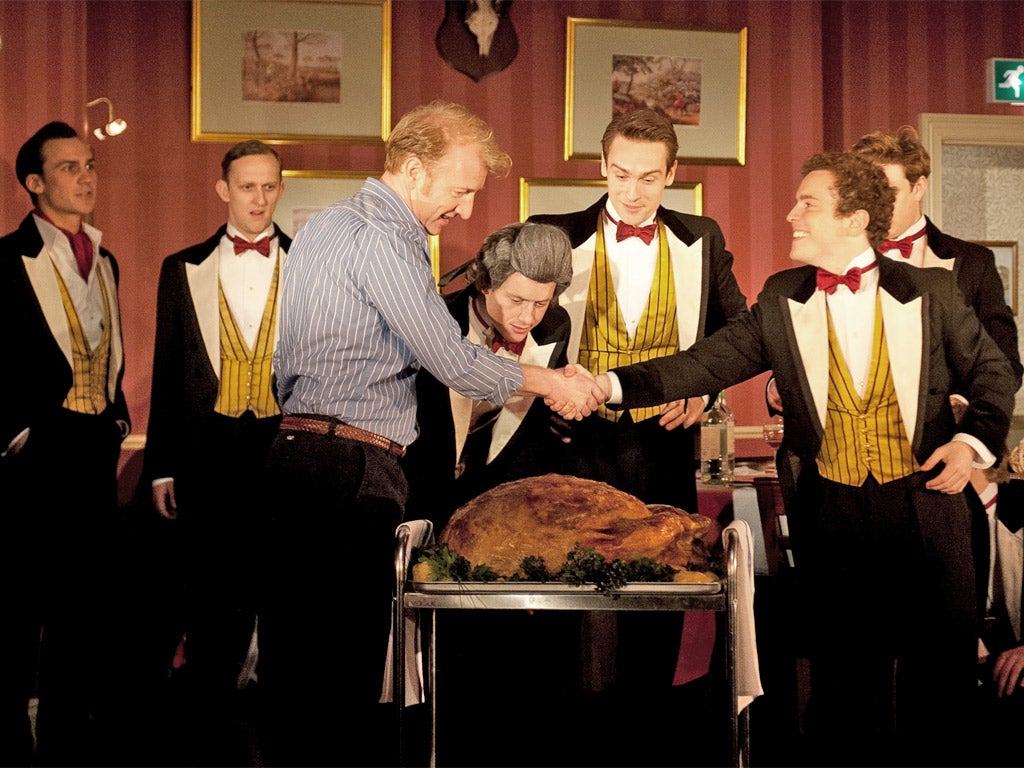First Night: Posh, Duke of York's Theatre, London
Public schoolboys take the stage – but they're not top-class

"Posh off!" was the headline in The Sun when, in the wake of the last Budget, Conservative MP Nadine Dorries described her own Prime Minister and Chancellor as "two arrogant posh boys" who don't know the price of milk and who show "no remorse, no contrition, and no passion to want to understand the lives of others". Both the headline and the comment must have been music to the ears of Laura Wade, whose Royal Court play Posh, revised to keep abreast of events, was readying itself to transfer to the West End after a two-year gap.
Originally unveiled just before the general election of 2010, the piece now returns – in the same electrically well-acted, high-definition production by Lyndsey Turner – at a time when those former members of the Bullingdon Club, David Cameron and George Osborne, have achieved the power to which they were then aspiring and have arguably endorsed the play's view of entrenched privilege in the double standards of tax cuts for the richest and the axeing of benefits for the poor.
Alistair Ryle (excellent Leo Bill) now makes reference, in his ranting against the plebs, to last summer's riots and to the scum, too idle to work in his opinion, who will loot for a pair of trainers.
That certainly reinforces the irony that these are young Riot Club toffs who think that waving a chequebook can hush up far more than the trashing of someone else's property – the attempted sexual assault on the landlord's daughter, say, and the near-fatal attack on him. Adjustments have necessarily been made to the treatment of Dmitri, the Greek plutocrat undergrad. And the ending, in which the disgraced Aliastair is seen in a London club being tempted back into the fold with both implicit threats and positive inducements from the old-boy network, seems to have been toned down to good effect.
From what the Leveson Inquiry has unearthed of how old Etonians look after each other, the import of this scene no longer feels quite so determinedly conspiracy-theorist. And yet none of the changes give a greater complexity to this undeniably powerful but crude play. It never startles you into a fresh apprehension of the deep-rooted social problem it dramatises.
One-sided in its sympathies, Posh presents us with specimens representing a grotesquely engorged sense of entitlement rather than with people who have the right, like all of us, not to be branded in advance because of our parentage.
Uniformly repellent and self-serving, these uppish undergrads never even seem particularly bright, when it's the brilliance of some of them that, along with their connections, make them so dangerous. For reasons that would spoil to reveal, I also think that Posh patronises two of its three lower-class characters. The laughter that the piece arouses sounds oddly complacent, not to say indulgent.
Like the "10-bird roast" that turns out to be one fowl short of the full culinary barnyard, Posh is one dimension short of being a great play.
Subscribe to Independent Premium to bookmark this article
Want to bookmark your favourite articles and stories to read or reference later? Start your Independent Premium subscription today.

Join our commenting forum
Join thought-provoking conversations, follow other Independent readers and see their replies